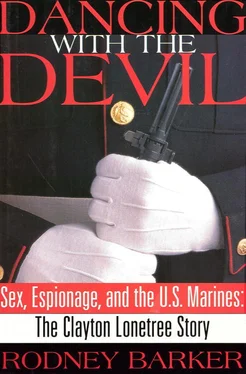And yet, paradoxically, at the same time Clayton Lonetree rejected the pity factor, underneath he also thrived on it. While he recognized there were people who invested his issue with something other than what was there for him—maybe it was white guilt, or they were seeking reflected glory from his stature as a media figure, or they had a personal grudge against the government, he didn’t know—the interest, the benevolence, even though it came from strangers and was often off base, countered the shame he felt for disgracing the Corps, his family, himself. And in its own strange way it kept him going.
The reason was perfectly understandable. Prison was a lonely experience, and prisoners were desperate for attention. They were surrounded by people they would prefer not to associate with and did not trust. Almost anyone who reached out a friendly hand from outside the prison walls was welcomed.
And if it happened to be women who were fawning over you, as was frequently the case with Clayton Lonetree, whether or not you agreed with their motives was often beside the point.
There exists a whole class of women who develop romantic obsessions with high-profile prisoners, especially those who appear to be victims of injustice, and among their numbers are a group of women, mostly white, who develop improbably erotic fixations on Native American male prisoners. While his court-martial was still in progress, there were women swooning over Sgt. Clayton Lonetree as a contemporary Native American warrior being crucified by the American military. Before he was even sentenced, he was receiving proposals of marriage; and after he was sent to Fort Leavenworth, the love letters kept coming. Some were from obviously disturbed women—one woman stalked his family in an effort to get close to him—but some bright and, by their pictures, quite attractive women of genuine merit also wrote him.
A young woman from Iowa with a history of crusading for the freedom of Native American “political prisoners” became a special one. Glory, as she liked to be called, started out writing to Lonetree as a pen pal. Then a friendship flourished, and soon they were exchanging several letters a week and talking on the phone almost as often.
Glory brought out the wistfully poetic side of Clayton Lonetree, which he expressed quite poignantly in writing. “Last night I heard the geese approaching through my barred window. Immediately I dropped what I was doing and searched the dark sky, hoping to catch a glimpse of at least one…. I saw none so I could only guess and speculate on the numbers in formation flying overhead. I am sure they were both beautiful and handsome… and then their quaint distinctive sound faded away.”
He offered his dreams to her for analysis. “In this one dream I had a year ago… I was in this cellar and the windows had bars from top to bottom. There was another person in the cellar with me and I am sure this person is someone I haven’t met yet. I can’t remember the person’s sex, but he/she was a friend. While we were talking a hummingbird flew in through the window and was trying to communicate with me. I would describe the situation as adorably cute. Yet, on the other hand, strange. Every time I touched the walls with my hand the little bird would fly and touch the spot that I had touched, as if it were worshipping it. Finally my friend said, ‘It loves you and wants to have your children.’ I was captivated and charmed. Immediately the little hummingbird flew out and in and started making a nest in the cellar…. I finally woke up feeling happy.”
He rhapsodized over his love of literature. “My sweet, don’t be alarmed about my seeming lack of attention. Other than you I have another friend of equal importance that has sustained me during these times. They are my books, most written by men long ago before we were conceived. If you were not here I swear I would be engrossed in them. They have helped me become wiser. As one author said, ‘It’s as if the authors were talking with you from a distant past.’ In today’s devotions it mentions how the apostle Paul while sitting in a prison cell imposed by the Romans had asked his friend to bring him parchments (books). I thought it was neat. They help keep your mind alert and some can even be heartwarming. They are a part of my life.”
Glory was part of Lonetree’s thinking as he looked toward the future, and they began to talk about moving to Arizona together when he got out of prison, where she would continue her education while he worked for the tribe as a counselor. There was a tremendous appeal to stepping straight into a family situation with someone who knew his past and was willing to accept him under these conditions. But there was also an aura of unreality to the relationship, and when Lonetree’s legal status changed again, so did his plans with Glory.
Every convening authority who refers charges to a court-martial takes some sort of action subsequent to a trial. He can either approve the sentence of the judge, or disapprove the sentence and reduce it. The convening authority at Quantico, Gen. C. Krulac, was still considering a decision on Lonetree’s sentencing rehearing when the Aldrich Ames case broke.
A fifty-two-year-old CIA counterintelligence agent, Aldrich Hazen Ames was arrested by the FBI in February of 1994 on charges he had been a Soviet mole since 1985; and during his debriefing sessions he admitted to things that added yet another twist to the Marine Spy Scandal. Ames said that after he had passed information to the KGB that allowed them to identify intelligence sources working for the CIA in the Soviet Union, a number of those assets had been rounded up and executed. Concerned that the CIA would suspect a traitor in its midst, Ames had complained to his handler, a Russian named Vladimir, who apologized for the rash response and told him that the KGB intended to implement a variety of diversionary campaigns to lead the CIA to think the problem lay elsewhere. Among the ploys Vladimir mentioned was creating the impression that there had been a breach in the security of the communications systems in the American Embassy in Moscow and that somehow the KGB had been able to obtain access to CIA operational records maintained there. Within two months Clayton Lonetree turned himself in, and within a matter of months the Marine Spy Scandal became a national sensation, leading Ames to conclude that this crisis was in part a deception manufactured by Soviet intelligence to throw CIA mole hunters off the scent.
These admissions clarified several unresolved issues for the intelligence community. Now the way Lonetree had been handled in Vienna could be understood in a larger context. He had come to the attention of the First Chief Directorate at a fortuitous time. Lonetree was of decreasing value, indeed headed toward self-destruction, but the KGB had one final use for him; as a human shield to protect Aldrich Ames.
The KGB knew that if Lonetree was “exposed,” the CIA, in the process of conducting a damage assessment, would be forced to consider him responsible for its losses. But the KGB needed it to happen in such a way that it did not give their real intentions away. This was why they wanted him to return to the Soviet Union: not for training or to see Violetta, but because once he was under their complete control they could announce that he had defected, leading inevitably to an assessment of his prior activities, which would take investigators to the American Embassy. And if Lonetree had balked and refused to return, his new handler would have continued to push him harder and harder, driving him to suicide or surrender, which would have served their purposes equally well.
At the same time this added a new perspective on the Lonetree case for intelligence officials, it also raised questions. Had the entire Marine Spy Scandal been an elaborate KGB scheme to shield Aldrich Ames? Had Lonetree been blamed for disclosures that actually came from Ames?
Читать дальше












